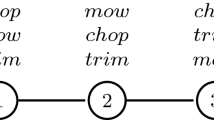Abstract
This paper studies a generalization of the well known house allocation problem in which agents may own fractions of different houses summing to an arbitrary quantity, but have use for only the equivalent of one unit of a house. It departs from the classical model by assuming that arbitrary quantities of each house may be available to the market. Justified envy considerations arise when two agents have the same initial endowment, or when an agent is in some sense disproportionately rewarded in comparison to her peers. For this general model, an algorithm is designed to find a fractional allocation of houses to agents that satisfies ordinal efficiency, individual rationality, and no justified envy. The analysis extends to the full preference domain. Individual rationality, ordinal efficiency, and no justified envy conflict with weak strategyproofness. Moreover, individual rationality, ordinal efficiency and strategyproofness are shown to be incompatible. Finally, two reasonable notions of envy-freeness, no justified envy and equal-endowment no envy, conflict in the presence of ordinal efficiency and individual rationality. All of the impossibility results hold in the strict preference domain.
Similar content being viewed by others
References
Abdulkadiroglu A, Sonmez T (1998) Random serial dictatorship and the core from random endowments in house allocation problems. Econometrica 66: 689–701
Abdulkadiroglu A, Sonmez T (1999) House allocation with existing tenants. J Econ Theory 88: 233–260
Ahuja R, Magnanti T, Orlin J (1993) Network flows: theory, algorithms, and applications. Prentice Hall, Englewood Cliffs, NJ
Bogomolnaia A, Moulin H (2001) A new solution to the random assignment problem. J Econ Theory 100: 295–328
Heo EJ (2010) Random assignment problem with quota: fairness and incentives. Manuscript
Katta A, Sethuraman J (2006) A solution to the random assignment problem on the full preference domain. J Econ Theory 131(1): 231–250
Lovasz L, Plummer MD (1986) Matching theory, annals of discrete mathematics, vol 29. North-Holland
Ma J (1994) Strategy-proofness and strict core in a market with indivisibilities. Int J Game Theory 23: 75–83
Shapley L, Scarf H (1974) On cores and indivisibility. J Math Econ 1: 23–28
Yilmaz O (2009) Random assignment under weak preferences. Games Econ Behav 66(1): 546–558
Author information
Authors and Affiliations
Corresponding author
Rights and permissions
About this article
Cite this article
Athanassoglou, S., Sethuraman, J. House allocation with fractional endowments. Int J Game Theory 40, 481–513 (2011). https://doi.org/10.1007/s00182-010-0251-9
Accepted:
Published:
Issue Date:
DOI: https://doi.org/10.1007/s00182-010-0251-9




